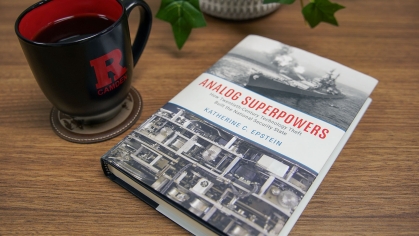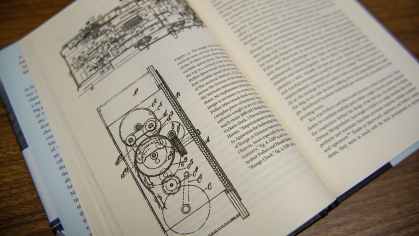How a Stolen Secret Transformed Warfare and Changed the Global Balance of Power

Professor’s book explores how the course of history was altered by the pirating of a British invention

In her thrilling new book, Analog Superpowers, published by the University of Chicago Press, Rutgers University–Camden Associate Professor of History Katherine C. Epstein weaves a complex narrative of top-secret weaponry, international affairs, and intellectual property ownership. Epstein draws upon a wealth of British and American archival materials to expose how the theft of early 20th-century technologies built the modern national security state.
Epstein investigates how the U.S. Navy and the Royal Navy sidestepped gunfire control patent rights before, during, and after World War I. This infringement helped shift political, military, and economic domination away from Britain to the United States.
According to Epstein, warships were of enormous geopolitical importance. Well before the dawn of intercontinental missiles or drones, battleship gunners had to shoot in poor light and poor weather on choppy seas at distant moving targets, against conditions that impeded accurate gunfire.

At the heart of this search for firepower precision was an invention, at the turn of the 20th century, by two English civilians—Arthur Pollen and Harold Isherwood—who became fascinated by the challenge of how to accurately aim the big guns of battleships.
“As a graduate student, when I first heard about naval fire control, I thought it was about putting out fires on ships,” Epstein said. “In fact, fire control refers to the calculations and technology needed for a gunner to successfully fire on an enemy warship.
“Pollen’s and Isherwood’s invention represented a quantum leap, not just an incremental improvement,” Epstein said. “Their discovery dominated surface-gunnery systems and laid the groundwork for anti-aircraft fire and aircraft bombsights, including the famous Norden bombsight. It can even be said to have anticipated nuclear missile guidance systems still in use today.”
Against naval opinion at the time, Pollen and Isherwood insisted the only way to enable hits under combat conditions was to incorporate all the relevant variables into mathematical equations and then process this data through computer-like instruments that instantaneously and continuously transmitted the results to gunners.

Pollen and Isherwood built just such a system for gathering data, calculating predictions, and transmitting the results. At its heart was the most advanced analog computer of the day. But this technology was pirated from its inventors by both the Royal Navy and the U.S. Navy. Their governments cited national security concerns when Pollen and Isherwood filed lawsuits for these thefts of intellectual property. According to Epstein, the cases established legal precedents for how the United States and Britain controlled military tools built by private contractors.
My book is not about heroes and villains. It’s about structural imbalances and conflicts of interest. By showing the history of how the secretive national security state and private property rights have come into conflict, I am suggesting that the usual ways we think about political categories—like right and left—may need rethinking.
Katherine C. Epstein
Associate Professor of History
Epstein, who is not from a military family, said that after September 11, 2001, she considered joining the United States Marine Corps. Instead, she pursued studies in international relations. She was awarded a one-year scholarship to study at Cambridge University, where she began to specialize in military history.
“I liked that historians wade into the messy stuff,” Epstein said. “I spent a lot of time in the weeds doing research for this book. Storytelling has got to be complex to be true.”
Epstein added that her account includes an unusual combination of subjects. In the introduction of Analog Superpowers, she packages fire-control technology with discussions of eminent domain and sovereign immunity. She probes the rivalries of great powers alongside the history of computers and the rise of the national security state.
Epstein encourages readers to come on board for the naval gunnery and stay for the political intrigue, secret legal battles, and technological developments to understand how these subjects are deeply, and surprisingly, interconnected.


